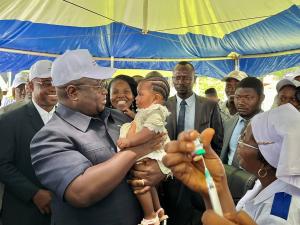Sierra Leone Introduces Malaria Vaccine
Freetown – On World Malaria Day, Sierra Leone officially launches the introduction and rollout of 550 000 RTS’S WHO approved vaccine procured by UNICEF with funding from GAVI, becoming the third country in 2024 to introduce this campaign after Cameroon and Burkina Faso.
The Government of Sierra Leone, supported by the World Health Organization (WHO), UNICEF, and other partners, started vaccination efforts at the Waterloo Health Center. Roll-out to health facilities nationwide will follow, targeting all six-month-old babies at risk of malaria-related death.
Sierra Leone is among the countries with the highest malaria burden globally, with over two million hospital visits annually attributed to the disease, half of these are children under the age of five. Malaria also accounts for 25% of all child deaths in the country.
“With the new, safe, and efficacious malaria vaccine, we now have an additional tool to fight this disease. In combination with insecticide-treated nets, effective diagnosis and treatment, and indoor spraying, no child should die from malaria infection,” said Dr Austin Demby, Minister of Health.
UNICEF, and WHO, along with Gavi, the Vaccine Alliance, USAID’s Breakthrough ACTION, Save the Children, the President’s Malaria Initiative, and World Vision, have supported national health authorities to strengthen =vaccine introduction measures.
“The launch of the malaria vaccine into the routine immunization service marks a laudable venture, ensuring that every child between the ages of 6 to 23 months has access to this life-saving intervention. This initiative not only underscores our commitment to achieving universal health coverage but also reflects our resolve to leave no child behind,” said Liv Elin Indreiten - UNICEF Representative a.i “It is a pivotal moment in our journey towards a malaria-free Sierra Leone complementing existing interventions such as insecticide-treated bed nets, indoor residual spraying, and prompt diagnosis and treatment,” she said.
A nationwide malaria campaign to distribute nearly 5.4 million special Insecticide-Treated Nets (ITNs) using a digitized registration system for the very first time, is being rolled out across the country. With $5.3 million from the Global Fund, UNICEF, WHO, and other partners are supporting the Ministry of Health in this effort.
Through the Accelerating Malaria Vaccine Introduction and Roll-out in Africa (AMVIRA) initiative, WHO also supported the development of a dashboard to track readiness assessment, vaccine supply and vaccination roll-out at the national and district levels. This tool will be an asset in generating and sharing key data to better understand vaccine uptake and delivery.
“Achieving national health goals requires a collective effort. The WHO commends the Government of Sierra Leone, ministry of health, healthcare workers, community leaders, and all the partners for their tireless efforts, collaboration, and cooperation in rolling out the malaria vaccine. It is crucial that we continue to work together to ensure every child can benefit from this life-saving intervention. Through innovations like the malaria vaccine and our continued partnership, we can look forward to a future where malaria no longer threatens the lives and potential of our children” said Dr Innocent B. Nuwagira, Representative a.i of WHO in Sierra Leone.
Since 2019, Ghana, Kenya and Malawi have administered the RTS,S vaccine in a four-dose schedule to children from around five months of age as part of the pilot Malaria Vaccine Implementation Programme (MVIP). According to WH, more than 2 million children have been reached, with more than 6 million doses administered, resulting in a significant 13% drop in all-cause mortality in children age-eligible to receive the vaccine, and substantial reductions in severe malaria illness and hospitalizations.
A total of 19 African countries are scheduled to launch the malaria vaccine this year. In addition to Sierra Leone, Benin and Liberia where vaccines have been received and are being administered.
About Gavi
Gavi, the Vaccine Alliance, is a pioneering public-private partnership committed to vaccinating over half of the world’s children against some of the deadliest diseases. By fostering collaboration between developing country and donor governments, alongside strategic partnerships with key stakeholders such as the WHO, UNICEF, and the vaccine industry, Gavi has played a monumental role in immunizing over 1 billion children since its inception in 2000. This collective effort has prevented more than 17.3 million future deaths and contributed to halving child mortality in 78 lower-income countries. Furthermore, Gavi’s contributions extend to enhancing global health security by supporting health systems, outbreak response initiatives, and funding critical vaccine stockpiles for diseases such as Ebola, cholera, meningococcal infection, and yellow fever.
For more information about Gavi’s transformative work, visit www.gavi.org and connect with us on social media platforms including Facebook and Twitter.
About UNICEF
UNICEF works in some of the world’s toughest places, to reach the world’s most disadvantaged children. Across 190 countries and territories, UNICEF work for every child, everywhere, to build a better world for everyone. For more information about UNICEF and its work for children, www.unicef.org/sierraleone, or on immunization here.
Stay updated on UNICEF’s immunization programs by following us on Twitter and Facebook.
About WHO
Guided by the principles of science and equity, the World Health Organization (WHO) leads global efforts to promote health and well-being for all. As the leading UN agency for health, WHO spearheads critical initiatives aimed at disease prevention, health system strengthening, and universal access to healthcare services. working with 194 Member States in 150 locations worldwide, WHO coordinates international responses to health emergencies, addresses the root causes of health disparities, and advocates for the most vulnerable populations. For authoritative information on global health issues and WHO’s impactful work, visit www.who.int and follow us on various social media platforms including Twitter, Facebook, Instagram, LinkedIn, TikTok, Pinterest, Snapchat, and YouTube.
Media Contacts:
WHO:
Madlyn Sharkah, sharkahm [at] who.intstyle="color:blue; text-decoration:underline"
UNICEF:
Issa Davies, idavies [at] unicef.org
Harriet Mason, hmason [at] unicef.org ()style="color:blue; text-decoration:underline"
